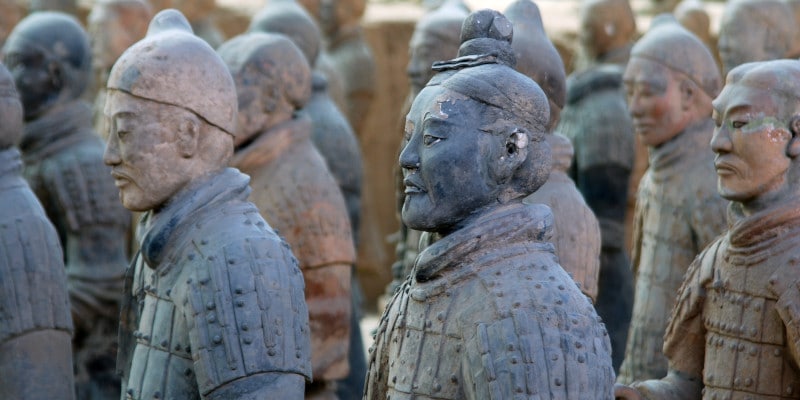The Greatest Strategy
The Greatest Strategy
by Helmi AJ – 29 Nov 2020
I have been fascinated with Sun Tzu ever since I was young. My friends and I used to sneak out of our houses, cycle to a computer centre in town and play the computer game Art of War for hours.
By today’s standards, the graphics were ridiculously cartoonish. The soldiers looked like children’s drawings and motion was stiff and slow because of the limited processing power of the 386 or 486 computers available at the time. In comparison, the latest games for the Playstation and Xbox boast Hollywood-quality cut scenes.
But we loved the game nonetheless. There is something romantically human about outfoxing an opponent. As they say, there is nothing more delicious than hunting something that hunts you.

Part of my training for the game included reading books on Sun Tzu’s Art of War. I could quote from the books. They helped me sound wise despite my young age. Never mind that I couldn’t really understand how the words apply in real life.
There was some advantage when playing the game though. I learnt that espionage was crucial when picking fights. Hit and run was very useful in wearing down more powerful opponents. The terrain and its effect on movement could mean the difference between victory and defeat.
Sun Tzu’s ideas are still taught in military academies around the world. While it has its roots in war, the concepts espoused by Sun Tzu has relevance in the business world. Just like in war, the tactics employed in operations and the strategies developed have profound impact on the survivability of the business.

I share below some of the more interesting excerpts of Sun Tzu’s Art of War and how they relate to business:
-
The art of war is of vital importance to the State. It is a matter of life and death, a road either to safety or to ruin. Hence it is a subject of inquiry which can on no account be neglected.
Likewise, it is vital to the survival of a business. We compete against our competitors for the attention of customers. We compete against their other distractions. This process of competing is a continuous battle. Often people mistake tactic for strategy. Tactics are specific actions taken to achieve a set of goals – the strategy.
The continuous state of competition requires strategy, not haphazardly putting together little plans, making things up as you go along. It requires a keen understanding of market trends, competitors’ long term plans, technological advancements and the evolving needs of your own stakeholders. The little plans – tactics – fit within this grand strategy. Learning how to formulate robust tactics and strategy shouldn’t be neglected.
-
The supreme art of war is to subdue the enemy without fighting
This is probably the reason many become enticed by insider trading. Earning large profits without any downside. A sure thing.
It doesn’t have to be applied towards something illegal. It just means that you need to be sure of the result before making the move. For example, you need to be certain that customers will buy your product before you launch. Focus groups and soft launches help give an idea of demand.
It is important to have the ability to evaluate risks before taking any action. A proper calculation of the possible outcomes of various options makes us better at adapting to changes – maximising opportunities and minimising losses. You can have a look at risk management in Islamic finance with our course NVIF209 Shariah Risk Management in Sukuk Issuances.
-
If you know the enemy and know yourself, you need not fear the result of a hundred battles. If you know yourself but not the enemy, for every victory gained you will also suffer a defeat. If you know neither the enemy nor yourself, you will succumb in every battle.
It’s impossible to know everything but we should try to minimise blindspots. The “enemy” here need not be our competitors. Knowing what our customers really want and what their plans are helps in our formulating a plan to capture their business.
Do they really desire our plain vanilla offering? Or are they actually looking for something more exotic?
We won’t know unless they feel comfortable whispering into our ear. And it wouldn’t matter unless they want to hear us out. Building on relationships is a worthwhile investment.
-
Engage people with what they expect; it is what they are able to discern and confirms their projections. It settles them into predictable patterns of response, occupying their minds while you wait for the extraordinary moment — that which they cannot anticipate.
This is the genius of strategy. When Dre – Karate Kid 2010 – said that the kung fu lady was mimicking the snake, his master – Mr. Han played by Jackie Chan – answered that it was the other way around. The lady was forcing the snake’s moves.
When you know that humans make decisions not because of logic – instead we act upon our emotions – it becomes easy to tempt someone. Luring him ever closer to you until such time he has no choice but to choose you.
Mastery of the game gives you control over the actions of your customers and competitors. It hands you an advantage that ensures the survivability of your business.
-
Do not repeat the tactics which have gained you one victory, but let your methods be regulated by the infinite variety of circumstances
The adage “If it ain’t broken, don’t fix it” comes to mind. Our typical folly is that we tend to think that when things are good, the good times will keep rolling. And when things are down, we are staring at a bottomless pit and there’s no hope.
We develop our plans around this sort of thinking. We believe that if we have had a measure of success, we shouldn’t change anything for fear that success will cease. We paralyse ourselves into inaction. Instead what we should do is constantly observe our environment, gain feedback on our actions and adjust our plans to suit the changing circumstances.
Islamic finance has been transformed through decades of practice. The tug of war between the Middle East and Malaysia displayed stark differences between a more conservative implementation of Islamic finance in the Middle Eastern countries and the more liberal viewpoints in Malaysia.
As investors become increasingly frustrated with the dearth of investment opportunities in the Middle East, scholars there turned more liberal. Malaysia too gravitated towards the Middle East as it courts new global investors.
These are examples of adapting to changing circumstances. Learn about how the goal of harmonisation eventually became realised in our course NVIF107 Fundamentals of Shariah-Compliant Finance.
There are many more ideas in the Art of War, too many to share in this article. Perhaps we will explore the rest in later articles. I leave you with another quote from Sun Tzu:
“There is no instance of a nation benefitting from prolonged warfare.”
Cooperation and collaboration with competitors often benefit our companies in the long run as opposed to constant competition which drives prices ridiculously low, refocus efforts way from innovation and tears down businesses through staff poaching.

